One of my favorite novels is F. Scott Fitzgerald’s “This Side of Paradise,” which I’ve read twice and recommend to anyone looking for a Fitzgerald novel other than “The Great Gatsby.” The novel chronicles the coming of age of Amory Blaine, an imaginative and intelligent student who comes to Princeton in the 1910s imbued with ambition and hope but becomes disaffected with the stultifying social conventions of college over the course of his time there.
To some readers, this narrative may seem a bit outdated, appearing a product of a bygone era of flapper dresses clashing with Victorian-Era stuffiness. But Amory’s disillusionment — and the title’s emphasis on the idea of “paradise” — provides an instructive framework for thinking about our own struggle as 21st-century Brown students seeking to lead meaningful lives.
Brown touts its reputation as one of America’s “happiest colleges,” and students consciously feel pressure to immediately feel like they are indeed in a “paradise” of sorts. From the moment we receive our acceptance letters or arrive for the bubbly activities of A Day on College Hill, we can sense the relentless cheeriness that pervades Brunonia. This can be particularly daunting for first-years expecting to find bliss instantly. My most anxiety-ridden semester was my first at Brown, as I struggled amid the wall of exuberance to fill my newly unstructured existence with a sense of purpose and to understand the secret to how so many people appeared so happy. The “happiest college” label that had enwrapped Brown’s package wore off, just like the genteel exterior of Princeton peeled away for Amory.
Two moments from my first year come to mind in my own search for purpose and community at Brown. One is a bit embarrassing: I accidentally cut my finger with a razor blade at about 2 a.m. one night in a dreary Keeney bathroom. No doubt displaying my only-child roots, I freaked out about the blood gushing from my finger and called the 24-hour phone line for nursing aid. When I was told I likely would have to be ambulanced, I hung up the phone, took a deep breath and instead knocked on my neighbor’s door. Though he’d already gone to sleep, my neighbor got up, helped me bandage and treat the injury (which we determined certainly did not require hospital treatment) and talked to me for awhile until the neurotic only child in me calmed down.
This moment stands out to me for illuminating how interconnected we are at Brown. Amid our college’s focus on “charting your own path” and individual freedom, it can be tough to be able to reach out to others as a first-year. The emphasis on maximizing one’s own joy can crowd out the very search for purpose and communal connectedness that make happiness possible. My neighbor’s kindness helped me understand it’s okay to turn to others for help.
My first sit-down with a Herald editor to go over a story I’d written was another turning point. I’d written a story with a glaring error — I hadn’t bothered to ask some students when they’d won a certain award that was the focus of the story — but my thoughtful editor walked me through his revisions with compassion and a calm demeanor. As I sat there in the bustling Herald newsroom, I listened to the witty banter between the newspaper’s editorial board members on production that night, while the editor’s concern for my personal development made me feel appreciated and valued. That night gave me a connection and sense of purpose that I hadn’t yet felt at Brown. I knew I’d found a family I’d stick with for the next four years.
In Fitzgerald’s novel, the veneer of perfection melts away for Amory in college, but his combination of laziness and inhibition prevents him from ever finding a compelling and meaningful purpose during his own time in the Ivy League. For first-years who can sense the cheeriness of upperclassmen but struggle to understand how Brown can be any sort of paradise amid the dislocating effects of moving to College Hill, don’t fall into the trap of staying in your Keeney or Pembroke rooms, afraid — like Amory — to reach out.
Knocking on my neighbor’s door and writing my first story for The Herald opened me to the buzzing range of possibilities for connectivity and purpose on this campus. The key at Brown is to see that the “happiest Ivy” label doesn’t come from just waiting for joy to spring forth. We got into Brown on the basis of our individuality and are pressured to manufacture happiness through an incessant focus on the self. But a truly meaningful time in college comes from the communal ties we make here, not from constantly asking ourselves how we can make ourselves happier.
Don’t think of Brown as an automatic paradise. The path to purpose and community can take unexpected directions on College Hill. Live uninhibitedly. Reach out.
Robert Kennedy adapted a line from Irish poet George Bernard Shaw: “Some people see things as they are and say why? I dream things that never were and say, why not?” Amory never asked “why not?” in college. When you walk through the Van Wickle Gates, make sure to avoid that mistake.
Mathias Heller, a history and economics concentrator from Alexandria, Virginia, is a former Herald managing editor. He will miss having Loui’s chocolate chip pumpkin pancakes at 5 a.m.





